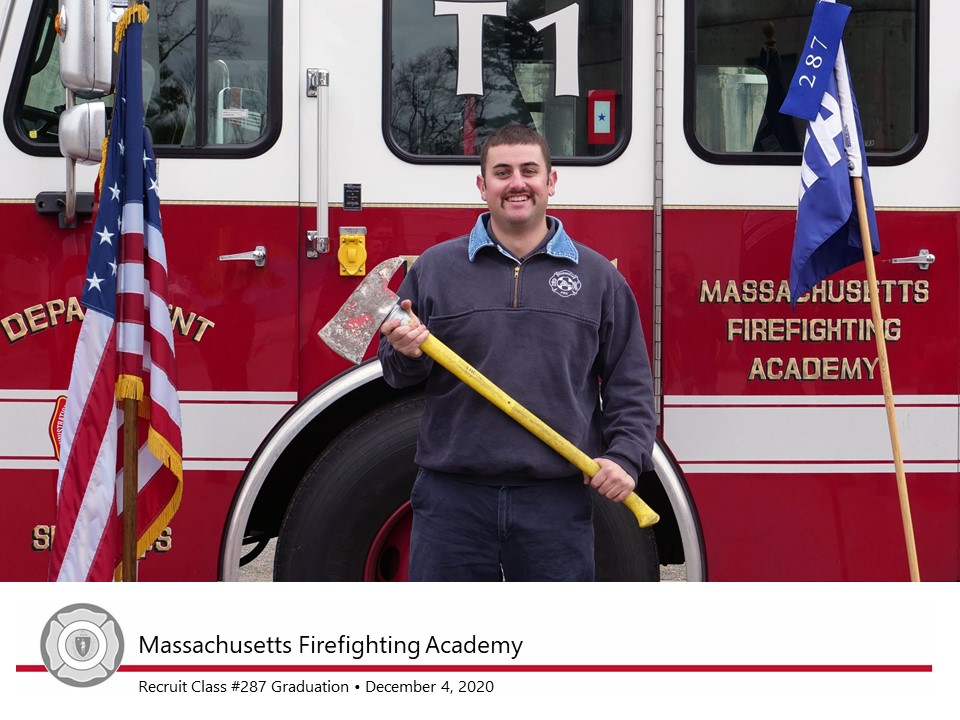[broadstreet zone=”52093″]
FRAMINGHAM – Massachusetts Fire Marshal Peter J. Ostroskey and Massachusetts Firefighting Academy (MFA) Director David C. Evans today, December 4, announced the graduation of the three classes that completed the Massachusetts Firefighting Academy’s 50-day Career Recruit Firefighting Training Program.
Class #287 trained at the Stow campus, Class #S19 trained at the Springfield campus and Class #BW06 trained at the Bridgewater campus. The ceremony took place at the Department of Fire Services in Stow.
“This rigorous professional training provides our newest firefighters with the basic skills to perform their jobs effectively and safely,” said State Fire Marshal Ostroskey. The Massachusetts Firefighting Academy (MFA), a division of the Department of Fire Services, offers this program tuition-free.
Among the 45 graduates were two for the Framingham Fire Department.
[broadstreet zone=”59948″]
The new Framingham firefighters are Matthew Bradley & Alan Mancini.
Mancini and Bradley were both hired on January 22, 2019, said Framingham Fire Chief Michael Dutcher.
Mancini is assigned to Group 3, Engine 1, said the Chief. Mancini was previously a Framingham Police Officer for a couple of years but took the Civil Service exam, and was hired by the Fire Department.
Mancini comes from a firefighting family, his brother is a Newton firefighter, said Chief Dutcher.
Mancini is a MA certified Firefighter I/II. and is a nationally-recognized EMT, said Chief Dutcher.
Mancini received the Richard N. Bangs Outstanding Student Award in Class 287 of the MA Firefighting Academy. This is a special recognition based on achievement in academic & practical skills, testing & evaluations.

Bradley is currently assigned to Group 2, Engine 1, said Chief Dutcher.
A Framingham High graduate, Bradley lives in Framingham.
Bradley is a legacy firefighter, his father Jerry, served the community as a firefighter for Framingham, retiring in 2009, said Chief Dutcher.
Bradley is a MA certified Firefighter I/II and a nationally-recognized EMT, said Chief Dutcher.
“First responders are on the frontlines protecting their communities and these newest firefighters are needed now more than ever. We have taken advantage of technology, reduced class size to increase social distancing, implemented daily screening, and required mask-wearing to keep our instructors and students as safe as possible during these uncertain times,” said MFA Director Evans.
Today’s firefighters do far more than fight fires. They are the first ones called to respond to chemical and environmental emergencies, ranging from the suspected presence of carbon monoxide to a gas leak. They may be called to rescue a child who has fallen through the ice or who has locked himself in a bathroom. They rescue people from stalled elevators and those who are trapped in vehicle crashes. They test and maintain their equipment including self-contained breathing apparatus (SCBA), hydrants, hoses, power tools, and apparatus.
[broadstreet zone=”59945″]
At the Massachusetts Firefighting Academy, they learn all these skills and more from certified fire instructors who are also experienced firefighters. Students learn all the basic skills they need to respond to fires, to contain and to control them. They also receive training in public fire education, hazardous material incident mitigation, flammable liquids, stress management, confined space rescue techniques, and rappelling. The intensive, 10-week program for municipal firefighters involves classroom instruction, physical fitness training, firefighter skills training, and live firefighting practice.
In response to the pandemic, the 10-week curriculum was reorganized to take advantage of online learning technology while ensuring plenty of practical skill experience on-campus with instructors. Students alternated between the virtual classroom for two weeks, on campus for practical training (using special safeguards and social distancing) for four weeks, back to the virtual classroom for a week, returning to campus for two weeks and finishing the final week in the virtual classroom.
Students receive classroom training in all basic firefighter skills. They practice first under non-fire conditions and then during controlled fire conditions. To graduate, students must demonstrate proficiency in life safety, search and rescue, ladder operations, water supply, pump operation, and fire attack. Fire attack operations range from mailbox fires to multiple-floor or multiple-room structural fires. Upon successful completion of the Recruit Program all students have met the national standards of National Fire Protection Association 1001 and are certified to the level of Firefighter I and II, and Hazardous Materials First Responder Operational Level by the Massachusetts Fire Training Council, which is accredited by the National Board on Fire Service Professional Qualifications.
[broadstreet zone=”59984″]
***




